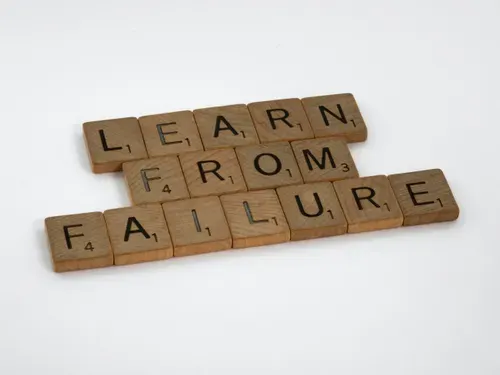How Can I Be More Resilient With My Goal?
Everyone experiences rough times but some people aren’t able to cope as easily when things get particularly hard.
Resilience is a key part of being human. It provides the capacity to bounce back no matter how much stress we come under and can help us successfully navigate our life’s challenges.

What is resilience?
- Resilience is the capacity to recover quickly from difficulties; toughness, or conversely
- The ability to spring back into shape - which to me is about flexibility rather than rigidness.
When we are feeling very down, it's important to remember that we can flow and navigate life’s curve balls, by digging down into our fears and raising our adaptability.
Why is Resilience Important?
We need to learn how to move beyond the things that made us cry yesterday. We can’t change the past. This is why flexibility is important.
When you're resilient, you are able to conquer obstacles and achieve your goals with ease. You're able to deal with whatever life throws at you.
However, if your resilience is low, it affects your performance at work. You lose motivation and ultimately fail to accomplish your goals. (although ‘failing’ is also a relative perspective).
Whilst for some it's not easy to be resilient, instead, think of it as cherishing what makes you happy. You can start focusing on one positive and improve on it by finding the lesson or the silver lining.

It’s also much healthier for your mind and body when your outlook is focused on the good rather than the bad. In any situation or point in time, if you can keep a positive attitude, your day becomes easier to move through.
When I went through chemo in the midst of the pandemic, there was a lot of fear and worry in my community and neighbourhood. I was surprised how many people commented on my sunny attitude, even when my eyes were raw from the treatments and my head was sensitive to my baldness.
My response was pretty much always the same, ‘I could have it worse.’
It's often easier said than done, I do understand that, and we do all have bad days once in a while. I found the key is to surrender to these moments (or days) in order to understand what the feelings are ‘trying to tell me.’
Personally, I take any negative emotion as a signal that something needs to be reflected on or changed. Rather than shying away from negative feelings, I prefer to lean in and explore with curiosity and inquiry, about why they have come up.

The turning point for me, always happened when I accepted what I couldn’t change. Keeping in mind that somebody may not have intentionally been meaning to offend or upset me, and giving the benefit of the doubt they are doing the best they can. Plus finding something - anything - to be grateful for.
For example, when my body ached and my appetite was shot, I would be thankful that this was only for a short period of time and that I didn’t have to permanently live with these ailments, like some unfortunate people.
“To put it bluntly I never allowed time to feel sorry for myself”.
There will always be setbacks in life and it comes down to a personal perspective whether somebody decides it’s a good or bad experience. But those that are able to take setbacks in their stride, are enhancing their resilience to better manage challenges that may arise in the future.
How Can I Be More Resilient?
People use many coping mechanisms to stay resilient. Different people find it helpful to develop particular strategies to get them through tough times. It is important to know the ones that make an improvement for their entire personal well-being. These may include:
A. Identifying and utilising personal strengths

When it comes to building resilience, it's important to know your strengths. Having appreciation over what you do have control of and how to leverage your natural talents - whilst outsourcing tasks that don’t come as easy - can generate a sense of ease with yourself.
B. Self-care and managing stress
Practising self-care - however that looks for you - can create an appreciation of self, rather than critical chastising.
This can additionally reduce the chance of burnout and help you to be more resilient. Some self-care options whilst they sound easy, can be the first to fall off our radar when we are focusing on ‘surviving’.

- Movement - doesn’t have to be a fully exertive exercise
- Eating well (ie nutritionally) fuelling our bodies when times are hectic
- Drinking quality water (we are made of 60-70% water after all)
- Meditation can be super powerful for calming our nervous system
- And maybe, just maybe, taking some time off! Even if just for a few hours.
C. Developing a positive outlook and sense of humour

Looking at life with irony can be a helpful starting point for those that are really struggling.
I’ve often been able to point out to new clients that if they couldn't handle the run of obstacles that they feel life or the universe is throwing at them, they simply wouldn’t be standing in front of me.
A positive sense and outlook can greatly enhance your ability to bounce back from life’s hurdles.
D. Setting realistic goals

Do you know that we find it easier to set BIG audacious goals in attainable time-frames but under-estimate the time and effort required for the stepping stone, smaller ones?!
This unrealistic approach, creates many downsides, including falling behind schedule which layers on self-doubt, a belief that we’re letting others down, as well as a spiraling set of negative thoughts.
So give some serious thought to your short and long-term goals, what is the actual effort required in order to set your goals more consciously.
*HACK* I write time estimates next to the items on my to-do list, this helps me quickly find tasks that can fit into windows of productivity.
E. Build a supportive network of family and friends

Lastly, whilst this is an external option, surrounding yourself with supportive people is a great way to become more resilient. Hosting my retreats with a limited number of like-minded, hand-selected people, really does create lasting bonds and relationships (as well as collaborations).
It’s not always hard to be resilient
It takes courage to share that at times we have lacked flexibility, but often the cause of that challenge can be co-created differently in the future, with others supporting you with alternative perspectives of solutions.
Can Resilience Be Taught or How Can I Build My Resilience?
It is not easy to be resilient, and we all have different ways of dealing with problems.
Some people will talk about their problems with friends and family, others will get an energy boost from exercising, and others will work on a problem until they have solved it.
Yes, it can be taught, but it’s better to ‘build resilience' by learning what works uniquely for you. Adapting and adjusting through the application is the best way to become more resilient.
No matter what your method is, I hope that you are able to use these tips and tricks to work through the challenges that you will inevitably face in your life.
I believe it’s by positively affirming our wins and successes that we LEARN resilience. Sure you can be taught some tips and tricks, but it’s through the ‘doing’ and being in the feeling of triumph that we become accustomed to the emotion of being able to go with the flow rather than feel frustrated.
If you have any questions on this topic or would like to leave a comment with your thoughts, please reach out and contact me!
